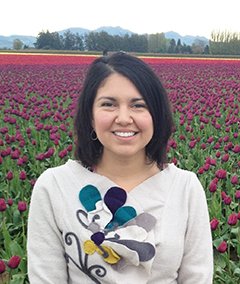Student Keynote Speaker: Alicia Mendez Sawers
"I think what surprised me most during my time at UW was just how many of our psychology students have beautiful, untold stories. These stories and the students are what really inspire me to keep reaching higher."
- Alicia Mendez Sawers
 |
| Alicia Mendez Sawers |
"I never graduated from high school," recounts Alicia Mendez Sawers, "and for years that filled me with shame." Growing up with a single mother who had to work multiple jobs to make ends meet, Alicia placed most of the focus in her teenage years on working to help provide for her and her mother who she ultimately lost several years later to cancer.
Fast forward to today and you will find what seems to be a fairytale ending to this particular story. Alicia graduated this June with a Bachelor of Arts in Psychology with Departmental Honors and is off to the East Coast to attend the MSW/Ph.D. program in Social Work at Rutgers University. This was one of several graduate programs from which she received offers. Alicia also has the distinction of having been the first graduating student to deliver a keynote speech at the Psychology Graduation Celebration.
In between those challenging high school years and the present is a string of hard fought for opportunities and stunning achievements. "I marvel at her trajectory and predict that she will be making a significant difference," says Psychology Professor Yuichi Shoda, Alicia's honors advisor. This comment encapsulates Alicia's story and is shared by faculty, students, and staff with whom she has worked and studied since transferring to UW in the fall of 2014 from North Seattle College. Her excitement about learning, strong intellect, commitment to the scientific process, and long-term desire to help people coping with sexual trauma are all impressive.
Equally, if not more impressive, is Alicia's sense of compassion and desire to build and strengthen community. As a peer leader for the Psychology Transfer Academic Community class (TRAC), she was a role model for her mentor group as well as a source of support and encouragement for her fellow mentors. "In that class I was able to provide social support and practical support as new students navigated the university system," recalls Alicia, "It really made me feel like I was making a difference in someone's life."
Alicia credits UW faculty members Yuichi Shoda, Stephanie Fryberg, as well as graduate student Laura Brady, with having made a big impact on her development as a student. She notes that Dr. Fryberg's course, "Racism and Minority Groups," led her to the topic of her honors thesis in which she looks at first generation college students and how they cope with challenge in an academic setting. She credits Yuichi Shoda and Laura Brady with showing her what a positive mentor-student relationship can look like. Alicia also points to the tremendous impact of the Ronald E. McNair Program which helped her to navigate the daunting process of applying to graduate school.
Now poised to begin the next chapter in her own story, one does indeed "marvel at her trajectory," and wonders about the other lives that this beautiful story will inspire.